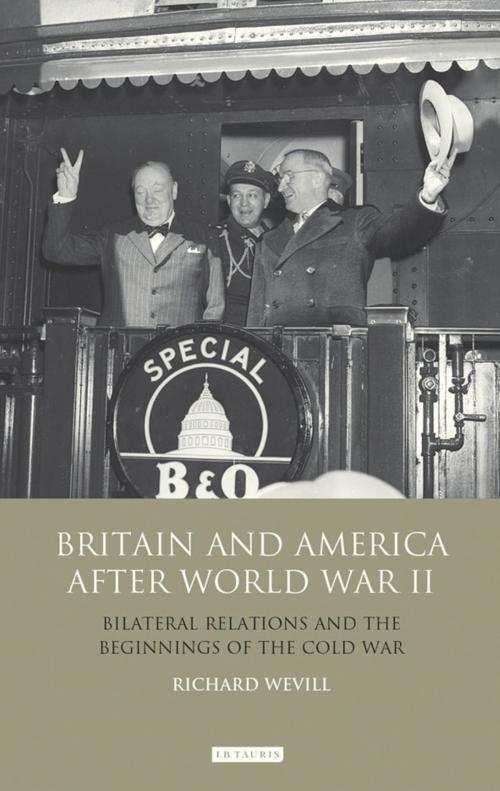Britain and America After World War II
Bilateral Relations and the Beginnings of the Cold War
Nonfiction, Social & Cultural Studies, Political Science, International, International Relations, History| Author: | Richard Wevill | ISBN: | 9780857732118 |
| Publisher: | Bloomsbury Publishing | Publication: | May 15, 2012 |
| Imprint: | I.B. Tauris | Language: | English |
| Author: | Richard Wevill |
| ISBN: | 9780857732118 |
| Publisher: | Bloomsbury Publishing |
| Publication: | May 15, 2012 |
| Imprint: | I.B. Tauris |
| Language: | English |
The period immediately after World War II was a vital one for diplomatic relations and, with the Soviet Union emerging as a new superpower, it was particularly important for Britain's relations with America. The subject has unsurprisingly already received much scholarly attention, but this is the first book to focus on the role of the British Embassy in Washington during this period. According to Richard Wevill, the British Embassy formed an essential part of the foreign policy-making process in London, and was pivotal in the fulfilment of key British foreign, financial and imperial policy objectives. Applying the implications of new archival material to the turning points of the period, including a detailed review of Lord Halifax's ambassadorship under Attlee, a re-evaluation of the part of Roger Makins in the atomic energy discussions, and the Embassy's influence in relation to Palestine, Wevill argues for a more nuanced understanding of the 'special relationship' in its most formative period.
With relations between nations in a state of flux, the Embassy in Washington was tasked with
pulling together the threads of a new world order, in which British influence was diminished and its overseas commitments greatly exceeded its material resources. Through wide-ranging primary source material, Wevill has produced a detailed picture of the postwar British agenda. Britain and America after World War II reveals for the first time the structures of power and hierarchies of information behind the major decisions, the covert and factional relations
with the US State Department and the frictions and agreements which were to shape the future of Britain - including the concessions imposed by the Marshall Plan, the intricate relationship with President Truman, Britain's failed attempts to co-ordinate America's policy towards the Middle East and the curtailment of atomic energy collaboration.
This was a period of robust American diplomacy, led by larger-than-life figures like General George Marshall, Dean Acheson and James F. Byrnes. In weaving British diplomacy into America's efforts to reshape the postwar world, this book charts the beginnings of one of the twentieth century's most influential alliances. As such it will be a primary reference point for students and scholars of Diplomacy, History, the Cold War, Politics and International Relations.
The period immediately after World War II was a vital one for diplomatic relations and, with the Soviet Union emerging as a new superpower, it was particularly important for Britain's relations with America. The subject has unsurprisingly already received much scholarly attention, but this is the first book to focus on the role of the British Embassy in Washington during this period. According to Richard Wevill, the British Embassy formed an essential part of the foreign policy-making process in London, and was pivotal in the fulfilment of key British foreign, financial and imperial policy objectives. Applying the implications of new archival material to the turning points of the period, including a detailed review of Lord Halifax's ambassadorship under Attlee, a re-evaluation of the part of Roger Makins in the atomic energy discussions, and the Embassy's influence in relation to Palestine, Wevill argues for a more nuanced understanding of the 'special relationship' in its most formative period.
With relations between nations in a state of flux, the Embassy in Washington was tasked with
pulling together the threads of a new world order, in which British influence was diminished and its overseas commitments greatly exceeded its material resources. Through wide-ranging primary source material, Wevill has produced a detailed picture of the postwar British agenda. Britain and America after World War II reveals for the first time the structures of power and hierarchies of information behind the major decisions, the covert and factional relations
with the US State Department and the frictions and agreements which were to shape the future of Britain - including the concessions imposed by the Marshall Plan, the intricate relationship with President Truman, Britain's failed attempts to co-ordinate America's policy towards the Middle East and the curtailment of atomic energy collaboration.
This was a period of robust American diplomacy, led by larger-than-life figures like General George Marshall, Dean Acheson and James F. Byrnes. In weaving British diplomacy into America's efforts to reshape the postwar world, this book charts the beginnings of one of the twentieth century's most influential alliances. As such it will be a primary reference point for students and scholars of Diplomacy, History, the Cold War, Politics and International Relations.















